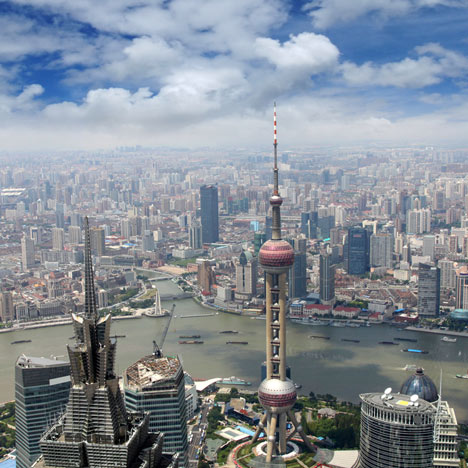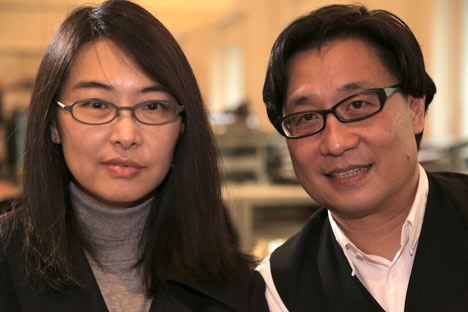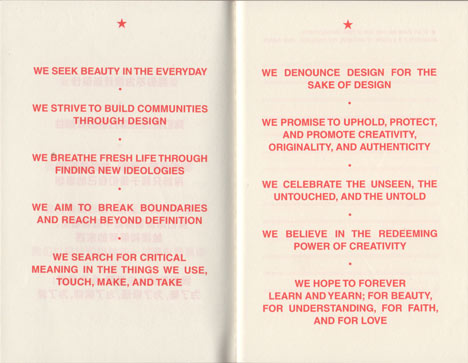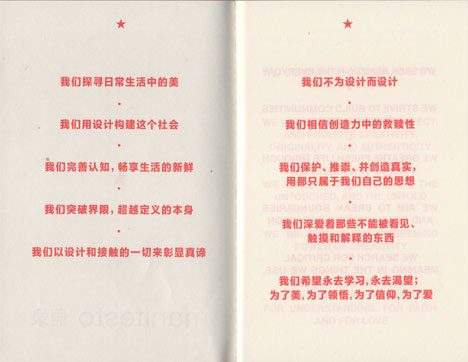
"Architects in China are lost" - Neri&Hu
News: Chinese architects need to develop their own design manifesto to stem the tide of "half-assed" building projects in the country, according to Lyndon Neri and Rossana Hu of Shanghai studio Neri&Hu. Update: this interview is featured in Dezeen Book of Interviews, which is on sale now for £12.
Speaking to Dezeen in Shanghai last week, the duo talked about "the absence of a modern Chinese architecture and design language" and added: "Architects feel lost".
Neri and Hu made the comments at the opening of their Design Republic Design Commune in the city's Jingan district, where they organised a series of discussions about the need for a new design manifesto for China.
Hu said the loss of belief is common to architects around the world, but is particularly critical in China due to the frenetic pace of development in the country. "A lot of architects in the US are lost, but there are no projects," Hu said. "Here, we are lost and we are building cities."
Neri added that Chinese developers often brief their construction teams by pointing to pictures in magazines: "It's done in such a half-assed way that it becomes scary," he said.
Last week Neri&Hu Design and Research Office invited international designers, architects and founders of design brands to Shanghai to discuss their own design manifestos at the opening of the building, which will be used to introduce Chinese audiences to design.
At the launch they distributed a booklet resembling Chairman Mao's Little Red Book containing a series of slogans such as "We seek beauty in the everyday" and "We denounce design for the sake of design, "which intended to stimulate debate about the meaning of design.
"If you tell people this kind of stuff here, they don't understand why you're even doing it," said Hu. "In the west, when you tell people about this, at least they understand why you're searching. They might be lost, but they know that they are lost. People are lost here, not knowing they're lost. That's a real danger."
Last month Aric Chen, the creative director of Beijing Design Week, told Dezeen that China needs to "slow down" and pay more attention to issues of authenticity, process and identity.
See all our stories about Neri&Hu | See all our stories about Shanghai
Top photograph of the Shanghai skyline is from Shutterstock.
Here's an edited transcript of the interview with Lyndon Neri and Rossana Hu, conducted by Dezeen editor-in-chief Marcus Fairs:

Rossana Hu: Lyndon and I are both architects but after we started our architecture practice here in Shanghai we also started another company called Design Republic. Design Republic is really a platform for design. We started with a retail concept but there are other things with regards to Design Republic that we’d like to incorporate into the retail environment.
One of them is education: educating the public about design, to bring designers from different parts of the world to China, to speak, to show their work, to engage with dialogue with the local designers here.
Lyndon Neri: The idea is to bring the best of what the world can offer to China. And hopefully, one day, our aspiration is to bring the best of what China can offer from a design point of view back to the world.
Rossana Hu: This week at the Design Republic Design Commune we are opening the space to the public and we’re having a two-day symposium series called Manifesto. We’ve invited a lot of guest speakers from all over the world to come and talk about design in different ways.
If we don't do this, and we only show and sell products, it's just meaningless. And vice-versa, if we only do the talks, and you read about these products but you don't see them, you don't touch them, that's also meaningless. And that was the case [in Shanghai] before Design Republic opened. You couldn't see classic modern design anywhere. There were no design museums, there were no shops that sell modern classics. People were just not interested.
Lyndon Neri: The idea of Manifesto started about actually seven years ago when Rossana and I edited a book called Persistence of Vision. We interviewed fifty architects practicing in Shanghai. We asked them twelve questions.
At the back of our mind was the notion of trying to find a manifesto in a city that is so busy; a city that is just building like mad. We realised that it was important to make sure that people are thinking, having a discourse.
Rosanna Hu: It all derived from when we first started working here. We were talking to both local and overseas Chinese who returned about working, the conditions of working here, and everyone's so busy and has no time to think, no time to talk to each other. And every time you do have time to talk, it's five to ten minutes, and you can never really engage in a meaningful way. And we thought, okay, if everyone feels that way, then that means everyone must welcome the chance to engage.
So we did the book as an effort to bring about community, and it did I think. It made all the people we interviewed rethink about why it is they're here. We asked a lot of questions about culture, space, location, your work; what your responsibility as an architect and designer is; are you happy with what you're doing here; those types of questions.
So we wanted Design Republic to be a platform, and the retail just became the easiest thing to start because the form of a shop is easy. It is something that people understand: you sell products.
But there are other things that we wanted to do: create a brand that incorporates other designers in China to bring about a Chinese voice in modern design; to be able to bring it to the world and to engage in the problems that exist here today.
Marcus Fairs: And how does that relate to what you're doing here? A lot of the speakers you have for your Manifesto talks here are from the West.
Rosanna Hu: From the book project we realised a lot of people were asking what today's manifesto in design is. And actually that's not just a Chinese problem; it's a global problem. Architects feel lost, we're no longer confined within architecture with the big A, the way I thought we were say fifteen years ago, twenty years ago. It was probably easier to design because everyone shared certain beliefs. We believe in manifestos, we believe that you need to stake your belief. If you know your dream, then you can chase after it.
Lyndon Neri: And be rigorous about it.
Rosanna Hu: And also we notice the absence of a collective voice. The absence of a modern Chinese architecture and design language.
Lyndon Neri: In China, the phenomenon of copying is very great. So people look at magazines and they go, "I could sort of do this minimalist thing, I'll have the contractor do something like this." It's done in such a mama huhu way; a half-assed, half-baked way that it becomes, you know, scary.
Marcus Fairs: Shanghai's quite funny to that extent because you have these western-style skyscrapers with Chinese details bolted on the top. It's quite surreal.
Rosanna Hu: Yes, and I mean it goes back to our thesis projects in graduate school. I remember having a discussion with my teacher at Princeton. I remember talking to him about my thesis proposal, discussing the problem of modernism, and regionalism versus globalism. He thought that to modernise means basically what Rem [Koolhaas] believes: the tabula rasa. There's no history; that's all baggage that you don't need. But I still insist that you are who you are. None of us can erase our past, and you bring the baggage with you and you've got to work with the baggage that you have.
And how do you then exist as a contemporary architect, working with a modern architectural language? How do you exist in this environment, what is it that we take with us? Maybe it's not our history from the Ming and Qing Dynasties or even earlier. Maybe it's what we see today. Maybe it's the toilet that's across your nongtang [traditional Shanghai lane-house] window that you can see from your neighbour's bathroom, or it's the broom that everyone hangs up. Maybe it's those very kind of mundane things of the everyday that gives you a clue to what to design.
But also, we recognise that we're only one part of the world, and we're only one very small part of the larger Chinese modern context. I like to learn from other disciplines, and I think that to learn from, say, how Chinese modern literature, Chinese modern art, Chinese modern music, has evolved to where they are today.
The modern [Chinese] language, the writing system is actually influenced from English writing; the same with poetry. People have gone abroad, studied and brought things back. You know if you look at the [Chinese architects] who are doing significant work here, very few of them have actually never done work abroad: Yung Ho [Chang] Ma [Qingyun], Ma Qingyun, Ma Yansong. Most of use went abroad, and now we are all back here, taking what we've learned and creating something new.
Lyndon Neri: [Vancouver-based architect and designer] Omer Arbel said something very interesting today when he was asked what he would say to Chinese architecture students. He says, growing up, it was easy to model his career on the protagonists of his time. In his case it was Rem Koolhaas. But then quickly he realised it was not just unattainable, but it was so abstract that to people in Vancouver it was meaningless. So then he started finding meaning within the context that he was practising, and that became interesting.
Marcus Fairs: You mentioned that these are global issues; to what extent are they issues in China too?
Rosanna Hu: It is even more of an issue here because more people are working here, and it's at a faster pace.
Lyndon Neri: It's amplified, exaggerated.
Rosanna Hu: So if you get lost, you get lost faster. And if you fall, you fall deeper.
Lyndon Neri: A lot of architects in the US are lost, but there are no projects. So they could be lost and not build. Here, we are lost and we are building cities. We're building cities, you know. For crying out loud!
Rosanna Hu: If you tell people this kind of stuff here, they don't understand why you're even doing it. They don't understand the need to have a manifesto. In the west, when you tell people about this, at least they understand why you're searching. They may not have it, they might be lost, but they know that they are lost. People are lost here, not knowing they're lost. That's a real danger.
Marcus Fairs: So the manifesto needs to be figured out pretty soon. And how are you going to do that?
Rosanna Hu: I don't really see that there needs to be an end. I don't think it's like saying, "Okay, once we formulate our manifesto, then this is it."

Marcus Fairs: You produced a little Manifesto booklet for the opening event [above and below].

Rosanna Hu: We really worked hard [on that]. We really thought about it and the reason why it's mostly blank pages is so that you write your own. And then they're offset with quotes from both Chinese writers, poets and Western writers’ quotes about life, about ideals, about utopia. This helps you set the tone. It’s the beginning but the key is that you're searching for something, and that your work will hopefully stand for something.
